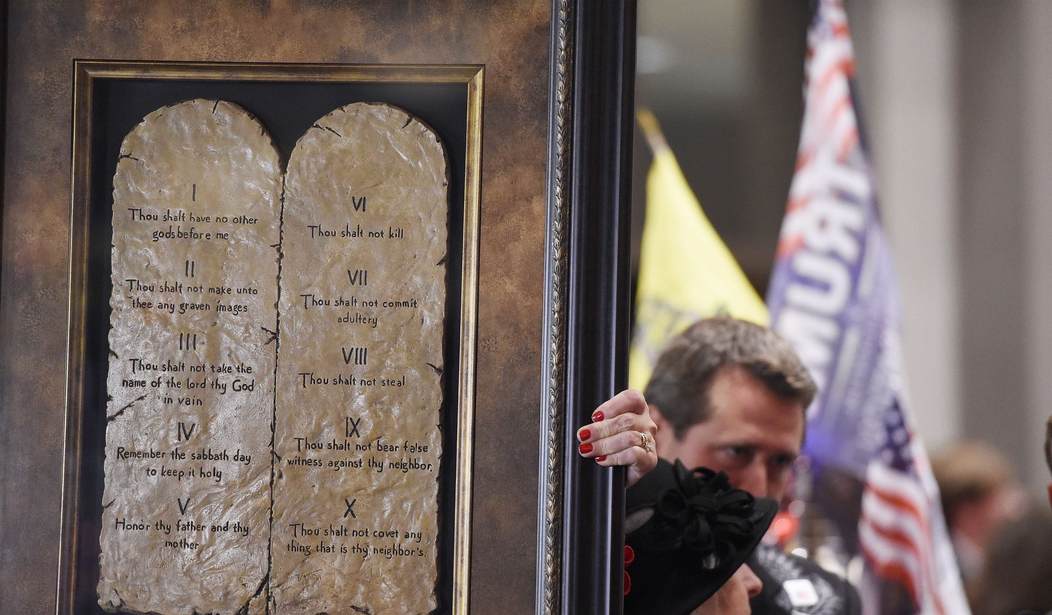A federal judge on Tuesday temporarily blocked a controversial Louisiana Law that requires government-run schools to display the Ten Commandments in each classroom.
The law, passed earlier this year, has met with criticism from people arguing that it violates the First Amendment, an argument U.S. District Judge John W. deGravelles repeated in his ruling. He said the law violates Constitutional prohibitions on the state endorsing a religion.
The group of parents, who come from different religious backgrounds and are supported by multiple civil rights groups, argued in court that the law infringes on their First Amendment rights to dictate their child’s religious upbringing.
In his ruling, deGravelles said he believed the plaintiffs would be “irreparably harmed” by the law going into place due to it violating the First Amendment.
Louisiana became the first state in the nation earlier this year to require the religious text to go up in all K-12 public schools in “large, easily readable font.” The posters would also include three paragraphs explaining why the Ten Commandments is relevant to American history.
“This ruling should serve as a reality check for Louisiana lawmakers who want to use public schools to convert children to their preferred brand of Christianity,” said Heather L. Weaver, senior staff attorney for the Program on Freedom of Religion and Belief at the American Civil Liberties Union, one of the groups supporting the parents in their challenge. “Public schools are not Sunday schools, and today’s decision ensures that our clients’ classrooms will remain spaces where all students, regardless of their faith, feel welcomed.”
Gov. Jeff Landry signed House Bill 71 into law in June. It mandates that schools display the Ten Commandments in each classroom by January 1, 2025. The posters must display the commandments in “large, easily readable font.”
Landry and other supporters of the measure argue that the Ten Commandments are foundational to the United States’ legal and moral framework. "If you want to respect the rule of law, you have to respect the original law giver, Moses,” Landry said at the time.
The legislation faced immediate legal challenges from various organizations, including the American Civil Liberties Union (ACLU), which insisted that requiring religious texts in government-run schools infringes on the notion of separation of church and state. The group argued that these displays would alienate students of diverse religious backgrounds.
The complaint further alleges that H.B. 71 “substantially interferes with and burdens” parents’ First Amendment right to direct their children’s religious education and upbringing, and that, in approving and mandating the display of a specific version of the Ten Commandments, the law runs afoul of the First Amendment’s prohibition against the government taking sides on questions of theological debate. Moreover, the complaint highlights the religiously coercive nature of the displays mandated by H.B. 71:
“Permanently posting the Ten Commandments in every Louisiana public-school classroom–rendering them unavoidable– unconstitutionally pressures students into religious observance, veneration, and adoption of the state’s favored religious scripture. It also sends the harmful and religiously divisive message that students who do not subscribe to the Ten Commandments—or, more precisely, to the specific version of the Ten Commandments that H.B. 71 requires schools to display—do not belong in their own school community and should refrain from expressing any faith practices or beliefs that are not aligned with the state’s religious preferences.”
In October, the judge heard arguments related to the constitutionality of the law. Opponents testified that there was minimal evidence to support the claim that the Ten Commandments significantly influenced the nation’s founding documents.
Courts have overturned similar laws in the past. The Supreme Court in 1980 struck down a Kentucky law requiring the display of the Ten Commandments in the classroom. The court held that these mandates did not have a secular legislative purpose and instead endorsed Christianity,
While the temporary injunction is now in place, the battle is not over. Some experts have suggested this case could make it all the way to the Supreme Court.













Join the conversation as a VIP Member